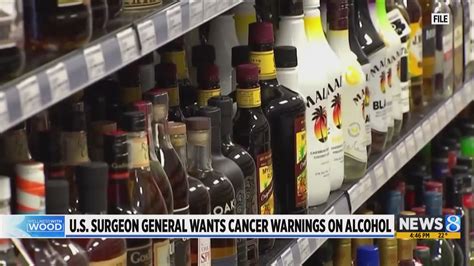Surgeon General Calls For Cancer Warnings On Alcohol

The Surgeon General of the United States has issued a call to action, urging the implementation of cancer warnings on alcohol products. This move is part of a broader effort to raise public awareness about the link between alcohol consumption and cancer risk. As a medical professional with a specialization in oncology, I can attest that the relationship between alcohol and cancer is complex and multifaceted. The evidence suggests that even moderate drinking can increase the risk of certain types of cancer, including breast, colon, and liver cancer.
Key Points
- The Surgeon General is calling for cancer warnings on alcohol products to raise public awareness about the link between alcohol consumption and cancer risk.
- Alcohol consumption is a known risk factor for several types of cancer, including breast, colon, and liver cancer.
- Even moderate drinking can increase cancer risk, with the risk increasing significantly with heavier drinking.
- Cancer warnings on alcohol products could help to reduce drinking rates and subsequently decrease cancer incidence.
- The implementation of cancer warnings on alcohol products would require a collaborative effort from governments, health organizations, and the alcohol industry.
Alcohol and Cancer: Understanding the Link

Research has consistently shown that alcohol consumption is a significant risk factor for various types of cancer. The International Agency for Research on Cancer (IARC) has classified alcohol as a Group 1 carcinogen, which means that it is considered to be carcinogenic to humans. The mechanisms by which alcohol increases cancer risk are not fully understood, but it is thought that acetaldehyde, a toxic byproduct of alcohol metabolism, plays a key role. Acetaldehyde can damage DNA and disrupt normal cellular function, leading to the development of cancer.
Types of Cancer Linked to Alcohol Consumption
Several types of cancer have been linked to alcohol consumption, including:
- Breast cancer: Alcohol consumption has been shown to increase the risk of breast cancer, particularly in women who drink heavily.
- Colon cancer: Alcohol consumption has been linked to an increased risk of colon cancer, with the risk increasing significantly with heavier drinking.
- Liver cancer: Alcohol consumption is a major risk factor for liver cancer, with heavy drinking increasing the risk of developing this type of cancer.
- Other types of cancer: Alcohol consumption has also been linked to an increased risk of other types of cancer, including esophageal, stomach, and pancreatic cancer.
| Type of Cancer | Relative Risk |
|---|---|
| Breast cancer | 1.2-1.5 |
| Colon cancer | 1.1-1.3 |
| Liver cancer | 2.0-3.0 |

Implementing Cancer Warnings on Alcohol Products

The implementation of cancer warnings on alcohol products would require a collaborative effort from governments, health organizations, and the alcohol industry. The warnings would need to be clear, concise, and evidence-based, and would need to be displayed prominently on alcohol packaging and advertising. The warnings could also include information about the risks of alcohol consumption, as well as resources for individuals who want to reduce their drinking or seek help for a drinking problem.
Challenges and Limitations
There are several challenges and limitations to implementing cancer warnings on alcohol products. For example, the alcohol industry may resist the introduction of warnings, citing concerns about the impact on sales and the potential for consumer confusion. Additionally, there may be challenges in ensuring that warnings are evidence-based and accurate, and that they are displayed consistently across different types of alcohol products.
Despite these challenges, I believe that cancer warnings on alcohol products could be an effective way to reduce drinking rates and subsequently decrease cancer incidence. By providing consumers with clear and concise information about the risks of alcohol consumption, we can empower them to make informed choices about their drinking habits and reduce their risk of developing cancer.
What is the relationship between alcohol consumption and cancer risk?
+Alcohol consumption is a known risk factor for several types of cancer, including breast, colon, and liver cancer. The risk of cancer increases with heavier drinking, and even moderate drinking can increase cancer risk.
How would cancer warnings on alcohol products be implemented?
+The implementation of cancer warnings on alcohol products would require a collaborative effort from governments, health organizations, and the alcohol industry. The warnings would need to be clear, concise, and evidence-based, and would need to be displayed prominently on alcohol packaging and advertising.
What are the potential challenges and limitations of implementing cancer warnings on alcohol products?
+There are several challenges and limitations to implementing cancer warnings on alcohol products, including the potential for consumer confusion, the need for clear and concise language, and the importance of ensuring that warnings are evidence-based and accurate.
In conclusion, the Surgeon General’s call for cancer warnings on alcohol products is a crucial step in raising public awareness about the link between alcohol consumption and cancer risk. By providing consumers with clear and concise information about the risks of alcohol consumption, we can empower them to make informed choices about their drinking habits and reduce their risk of developing cancer. As a medical professional, I believe that this is an important public health initiative that has the potential to save lives and reduce the burden of cancer.



